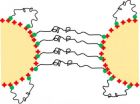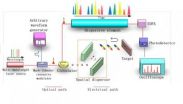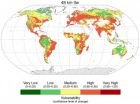(Press-News.org) A St. Jude Children's Research Hospital study found that 73 percent of adult survivors of childhood cancer more than doubled their risk of developing metabolic syndrome and related health problems by failing to follow a heart-healthy lifestyle. The results appear in the current issue of the journal Cancer.
Almost 32 percent of the 1,598 adult survivors of childhood cancer in the study had metabolic syndrome, an umbrella term for health risk factors like high blood pressure, abdominal obesity, elevated triglyceride and other abnormalities that often occur together. The prevalence was similar to rates reported for much older adults in the general public. Metabolic syndrome is associated with greater odds of developing heart disease, diabetes, stroke and other potentially fatal health problems.
Researchers reported that adult survivors of childhood cancer who failed to adopt a lifestyle that included regular exercise and a healthy diet were more than twice as likely to develop metabolic syndrome as survivors who did. The risk was 2.4 times higher in women and 2.2 times greater in men.
Lifestyle had a greater impact on the likelihood of developing metabolic syndrome than risk factors associated with childhood cancer treatment, including cranial irradiation.
"This is good news for the nation's growing population of adult survivors of childhood cancer," said corresponding author Kirsten Ness, Ph.D., an associate member of the St. Jude Department of Epidemiology and Cancer Control. "This suggests that if you maintain a healthy lifestyle by staying active and eating a diet that is low in fat, sugar and salt and rich in fruit and vegetables you should be able to influence whether or not you develop metabolic syndrome."
The United States is home to more than 360,000 childhood cancer survivors. With childhood cancer survival rates now better than 80 percent, the survivor population is expected to grow. Previous research from St. Jude and others found that many survivors face significant challenges, including chronic health problems, and may be at risk for premature aging. Survivors whose cancer treatment included chest and cranial irradiation or chemotherapy with anthracylcine are known to be at an increased risk for cardiomyopathy or metabolic syndrome. A previous St. Jude-led study found that lifestyle and risk factors related to cancer treatment were a particularly toxic mix for aging childhood cancer survivors.
This study was the largest yet to evaluate how lifestyle impacts the risk of metabolic syndrome in a diverse group of pediatric cancer survivors. The participants were enrolled in the St. Jude Lifetime Cohort Study (St. Jude LIFE), which brings childhood cancer survivors treated at St. Jude back to the hospital for several days of health screenings and other tests. Participants are at least 18 years old and 10 years from their diagnosis. Survivors in this study ranged in age from 19 to 60 years old. Half were less than 33 years old. Previous studies of metabolic syndrome in pediatric cancer survivors focused primarily on survivors of acute lymphoblastic leukemia (ALL), but this study included survivors of various cancers, including lymphoma, sarcoma, neuroblastoma, brain and other tumors.
The prevalence of metabolic syndrome among survivors, 22 percent of whom were older than age 40, was 31.5 percent. That was greater than rates reported in small studies of young pediatric cancer survivors, but comparable to the 34 percent reported in the general population, 68 percent of whom were older than 40.
Health screenings and survivor self-reports found that 27 percent of study participants met at least four of seven requirements for a healthy lifestyle as defined by the World Cancer Research Fund/American Institute for Cancer Research. The list included maintaining a healthy weight, moderate intake of alcohol and red meat, being physically active and eating a diet low in sodium and high in complex carbohydrates, fruits and vegetables. About two-thirds of survivors in this study were overweight or obese, three-quarters reported eating less than five servings of fruits and vegetables daily and more than half reported inadequate exercise or complex carbohydrates. In addition, 90 percent reported eating too much red meat and nearly 70 percent too much sodium.
Healthier habits are proven to reduce the risk of metabolic syndrome in the general public. St. Jude is planning interventions to determine if the same is true for childhood cancer survivors and to help survivors of all ages make changes to benefit their long-term health.
INFORMATION:
Webb Smith, formerly of St. Jude, is the study's first author. The other authors are Chenghong Li, Kerri Nottage, Daniel Mulrooney, Gregory Armstrong, Jennifer Lanctot, Wassim Chemaitilly, Deo Kumar Srivastava, Leslie Robison and Melissa Hudson, all of St. Jude; and Joseph Laver, formerly of St. Jude.
The study was funded in part by a grant (CA21765) from the National Cancer Institute, part of the National Institutes of Health, and ALSAC.
St. Jude Children's Research Hospital
St. Jude Children's Research Hospital is leading the way the world understands, treats and cures childhood cancer and other life-threatening diseases. It is the only National Cancer Institute-designated Comprehensive Cancer Center devoted solely to children. Treatments developed at St. Jude have helped push the overall childhood cancer survival rate from 20 percent to 80 percent since the hospital opened more than 50 years ago. St. Jude is working to increase the overall survival rate for childhood cancer to 90 percent in the next decade. St. Jude freely shares the breakthroughs it makes, and every child saved at St. Jude means doctors and scientists worldwide can use that knowledge to save thousands more children. Families never receive a bill from St. Jude for treatment, travel, housing and food—because all a family should worry about is helping their child live. To learn more, visit stjude.org or follow St. Jude at @stjuderesearch.
Unhealthy habits more than double risk of metabolic syndrome in childhood cancer survivors
St. Jude Children's Research Hospital study finds that few adult survivors of childhood cancer follow a heart-healthy lifestyle that protects against heart disease, diabetes and other health problems
2014-07-28
ELSE PRESS RELEASES FROM THIS DATE:
Seeing is bead-lieving
2014-07-28
HOUSTON – (July 28, 2014) – Rice University researchers are using magnetic beads and DNA "springs" to create chains of varying flexibility that can be used as microscale models for polymer macromolecules.
The experiment is visual proof that "bead-spring" polymers, introduced as theory in the 1950s, can be made as stiff or as flexible as required and should be of interest to materials scientists who study the basic physics of polymers
The work led by Rice chemical and biomolecular engineer Sibani Lisa Biswal and graduate student Julie Byrom was published this month in ...
Mutations from Venus, mutations from Mars
2014-07-28
Some 15% of adults suffer from fertility problems, many of these due to genetic factors. This is something of a paradox: We might expect such genes, which reduce an individual's ability to reproduce, to disappear from the population. Research at the Weizmann Institute of Science that recently appeared in Nature Communications may now have solved this riddle. Not only can it explain the high rates of male fertility problems, it may open new avenues in understanding the causes of genetic diseases and their treatment.
Various theories explain the survival of harmful mutations: ...
Measuring the smallest magnets
2014-07-28
Imagine trying to measure a tennis ball that bounces wildly, every time to a distance a million times its own size. The bouncing obviously creates enormous "background noise" that interferes with the measurement. But if you attach the ball directly to a measuring device, so they bounce together, you can eliminate the noise problem.
As reported recently in Nature, physicists at the Weizmann Institute of Science used a similar trick to measure the interaction between the smallest possible magnets – two single electrons – after neutralizing magnetic noise that was a million ...
Social network research may boost prairie dog conservation efforts
2014-07-28
Researchers using statistical tools to map social connections in prairie dogs have uncovered relationships that escaped traditional observational techniques, shedding light on prairie dog communities that may help limit the spread of bubonic plague and guide future conservation efforts. The work was done by researchers from North Carolina State University and the National Evolutionary Synthesis Center (NESCent).
"Prairie dogs are increasingly rare and are subject to bubonic plague," says Dr. Jennifer Verdolin, lead author of a paper on the work and an animal behavior ...
Motivation explains disconnect between testing and real-life functioning for seniors
2014-07-28
A psychology researcher at North Carolina State University is proposing a new theory to explain why older adults show declining cognitive ability with age, but don't necessarily show declines in the workplace or daily life. One key appears to be how motivated older adults are to maintain focus on cognitive tasks.
"My research team and I wanted to explain the difference we see in cognitive performance in different settings," says Dr. Tom Hess, a professor of psychology at NC State and author of a paper describing the theory. "For example, laboratory tests almost universally ...
Wearable device for the early detection of common diabetes-related neurological condition
2014-07-28
WASHINGTON, July 28, 2014—A group of researchers in Taiwan has developed a new optical technology that may be able to detect an early complication of diabetes sooner, when it is more easily treated. If the device proves safe and effective in clinical trials, it may pave the way for the early detection and more effective treatment of this complication, called diabetic autonomic neuropathy, which is common among people with both Type 1 and Type 2 diabetes. The condition progressively affects the autonomic nerves controlling vital organs like the heart and gastrointestinal ...
Potential 'universal' blood test for cancer discovered
2014-07-28
Researchers from the University of Bradford, UK, have devised a simple blood test that can be used to diagnose whether people have cancer or not.
The test will enable doctors to rule out cancer in patients presenting with certain symptoms, saving time and preventing costly and unnecessary invasive procedures such as colonoscopies and biopsies being carried out. Alternatively, it could be a useful aid for investigating patients who are suspected of having a cancer that is currently hard to diagnose.
Early results have shown the method gives a high degree of accuracy ...
Gender inequalities in health: A matter of policies
2014-07-28
A new study of the European project SOPHIE has evaluated the relationship between the type of family policies and gender inequalities in health in Europe. The results show that countries with traditional family policies (central and southern Europe) and countries with contradictory policies (Eastern Europe), present higher inequalities in self-perceived health, i.e. women reported poorer health than men. Health inequalities are especially remarkable in Southern Europe countries, where women present a 27% higher risk of having poor health compared to men.
The authors of ...
Serial time-encoded amplified microscopy for ultrafast imaging based on multi-wavelength laser
2014-07-28
Ultrafast real-time optical imaging is an effective and important tool for studying dynamical events, such as shock waves, neural activity, laser surgery and chemical dynamics in living cells. Limited by the frame rate, conventional imaging system such as charge-coupled device (CCD) and complementary metal oxide semiconductor (CMOS) imaging device can not image fast dynamic processes. Last few years, serial time-encoded amplified microscopy (STEAM) technique based on space-frequency mapping combined with frequency-time mapping has been demonstrated as a completely new optical ...
Study finds Europe's habitat and wildlife is vulnerable to climate change
2014-07-28
New research has identified areas of the Earth that are high priorities for conservation in the face of climate change.
Europe is particularly vulnerable, as it has the lowest fraction of its land area, only four per cent, of any continent in 'refugia' – areas of biological diversity that support many species where natural environmental conditions remain relatively constant during times of great environmental change. The refugia that do exist in Europe are mostly in Scandinavia and Scotland.
The biggest refugia are in the Amazon, the Congo basin, the boreal forests ...
LAST 30 PRESS RELEASES:
Smithsonian planetary scientists discover recent tectonic activity on the Moon
Government censorship of Chinese chatbots
Incorporating a robotic leg into one’s body image
Brain imaging reveals how wildlife photos open donor wallets
Wiley to expand Advanced Portfolio
Invisible battery parts finally seen with pioneering technique
Tropical forests generate rainfall worth billions, study finds
A yeast enzyme helps human cells overcome mitochondrial defects
Bacteria frozen in ancient underground ice cave found to be resistant against 10 modern antibiotics
Rhododendron-derived drugs now made by bacteria
Admissions for child maltreatment decreased during first phase of COVID-19 pandemic, but ICU admissions increased later
Power in motion: transforming energy harvesting with gyroscopes
Ketamine high NOT related to treatment success for people with alcohol problems, study finds
1 in 6 Medicare beneficiaries depend on telehealth for key medical care
Maps can encourage home radon testing in the right settings
Exploring the link between hearing loss and cognitive decline
Machine learning tool can predict serious transplant complications months earlier
Prevalence of over-the-counter and prescription medication use in the US
US child mental health care need, unmet needs, and difficulty accessing services
Incidental rotator cuff abnormalities on magnetic resonance imaging
Sensing local fibers in pancreatic tumors, cancer cells ‘choose’ to either grow or tolerate treatment
Barriers to mental health care leave many children behind, new data cautions
Cancer and inflammation: immunologic interplay, translational advances, and clinical strategies
Bioactive polyphenolic compounds and in vitro anti-degenerative property-based pharmacological propensities of some promising germplasms of Amaranthus hypochondriacus L.
AI-powered companionship: PolyU interfaculty scholar harnesses music and empathetic speech in robots to combat loneliness
Antarctica sits above Earth’s strongest “gravity hole.” Now we know how it got that way
Haircare products made with botanicals protects strands, adds shine
Enhanced pulmonary nodule detection and classification using artificial intelligence on LIDC-IDRI data
Using NBA, study finds that pay differences among top performers can erode cooperation
Korea University, Stanford University, and IESGA launch Water Sustainability Index to combat ESG greenwashing
[Press-News.org] Unhealthy habits more than double risk of metabolic syndrome in childhood cancer survivorsSt. Jude Children's Research Hospital study finds that few adult survivors of childhood cancer follow a heart-healthy lifestyle that protects against heart disease, diabetes and other health problems







